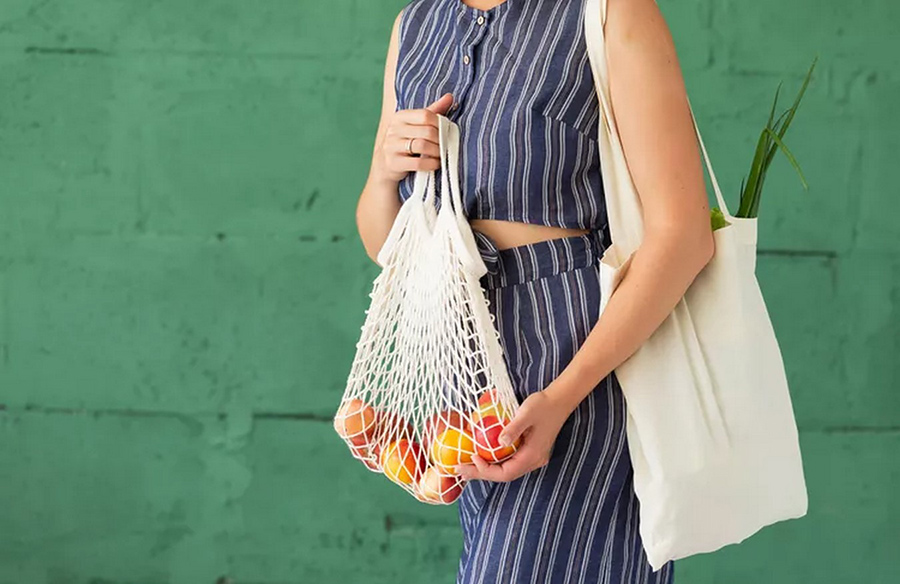Transitioning to a plastic-free lifestyle can be overwhelming for beginners, but focusing on specific areas of daily life can make the process more manageable. From grocery shopping to personal care and eating on the go, implementing small changes in these three key areas can lead to significant reductions in plastic consumption. Here’s a beginner’s guide to embarking on a plastic-free journey, featuring practical tips and alternatives for sustainable living.
Revolutionizing Grocery Shopping
The conventional approach to grocery shopping often results in excessive plastic waste, but adopting a mindful approach can minimize environmental impact. By integrating reusable bags, containers, and bulk purchasing into your shopping routine, you can significantly reduce plastic packaging.
Bring Your Own Bag: Equip yourself with reusable bags, containers, and boxes to carry groceries. Utilize a variety of eco-friendly options such as cotton drawstring bags, glass jars, and metal canisters. Familiarize yourself with local stores that support the use of reusable containers, as many establishments are increasingly accommodating in response to growing awareness of plastic pollution.
Buy in Bulk: Explore bulk shopping options available in your area, such as Bulk Barn in Canada or similar stores in the United States. Bulk purchasing allows you to obtain various staples, including grains, nuts, spices, and cereals, without plastic packaging. Additionally, consider joining a produce subscription box or CSA program to access plastic-free vegetables.
Refill Your Milk Jars: Opt for dairy products packaged in reusable glass jars whenever possible. Some retailers offer milk in returnable glass containers, promoting a circular economy and reducing single-use plastic waste.
Purchase Bread and Meat Plastic-Free: Support local bakeries for plastic-free bread options and visit butcher shops for unpackaged meat. By prioritizing bulk purchases and direct sourcing, you can minimize plastic packaging associated with staple food items.
Transforming Bathroom Products
Transitioning to plastic-free alternatives in the bathroom is essential for reducing personal plastic waste. From bar soap to shampoo alternatives and moisturizers, eco-conscious choices can significantly decrease reliance on plastic-packaged products.
Buy Bar Soap: Replace liquid soap and shower gels with bar soap packaged in minimal or plastic-free materials. Look for brands that offer bar soap options in paper wrapping or reusable containers.
Shampoo Alternatives: Explore solid shampoo-conditioner bars as an eco-friendly alternative to conventional liquid shampoo. Additionally, consider using multi-purpose products such as castile soap or exploring refillable options for liquid products.
Moisturizers: Opt for moisturizers available in glass jars or paper packaging to minimize plastic waste. Natural alternatives like coconut oil or lotion bars wrapped in paper offer sustainable options for skincare.
Sustainable Eating on the Go
Maintaining a plastic-free lifestyle while eating on the go requires preparation and conscious choices. By packing your own food, investing in reusable containers, and prioritizing dine-in options, you can minimize reliance on single-use plastic packaging.
Pack Your Own Food: Prepare snacks and meals at home using reusable containers and washable cloth bags. Investing in high-quality, durable containers made of metal or glass eliminates the need for disposable packaging.
Keep a Kit in Your Car: Create a zero-waste food kit stocked with reusable essentials such as containers, straws, coffee cups, water bottles, and napkins. Having these items readily available ensures sustainable eating options while on the move.
Dine in Instead of Taking Out: Opt for dine-in experiences whenever possible to avoid single-use plastic containers and cutlery. Enjoying meals at restaurants or cafes provides opportunities to minimize plastic waste and promote mindful consumption.
Conclusion
Embarking on a plastic-free lifestyle requires a commitment to sustainable practices and conscious consumption. By focusing on key areas such as grocery shopping, bathroom products, and eating on the go, beginners can initiate meaningful changes that contribute to reducing plastic waste. Establishing these new habits serves as a foundation for further sustainability efforts, paving the way for a more eco-conscious lifestyle.


